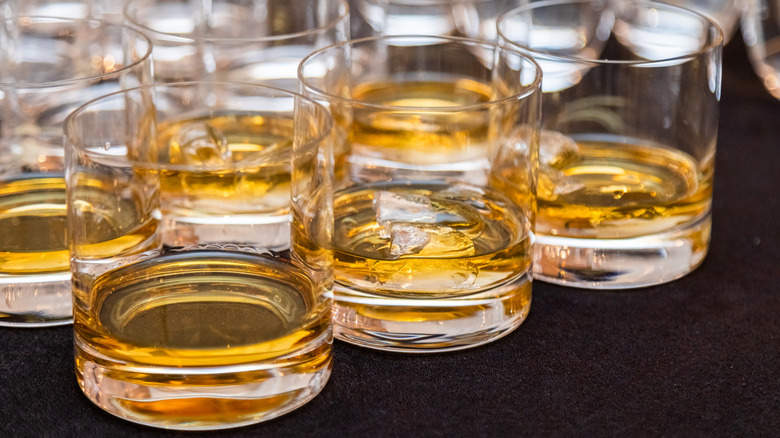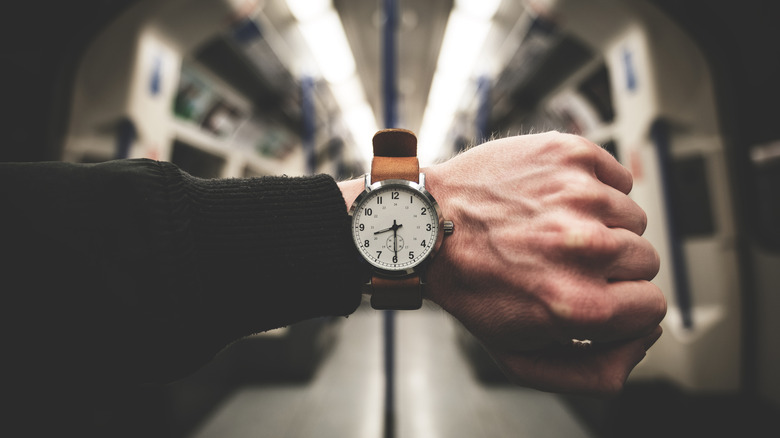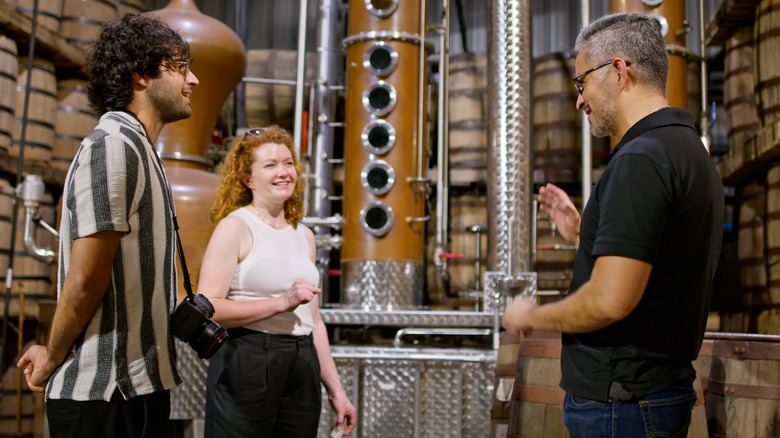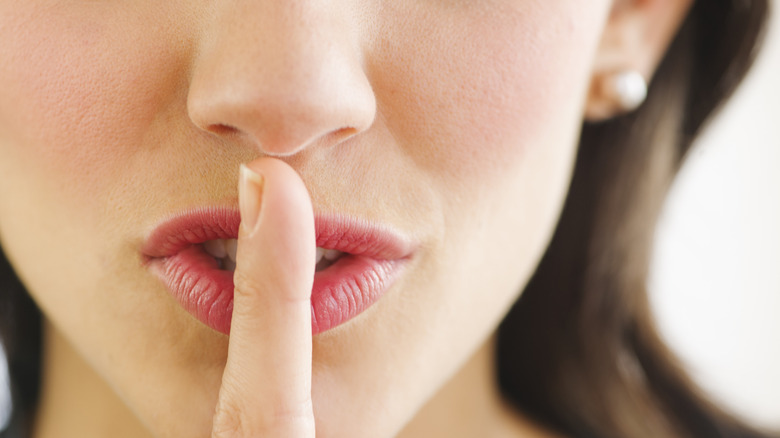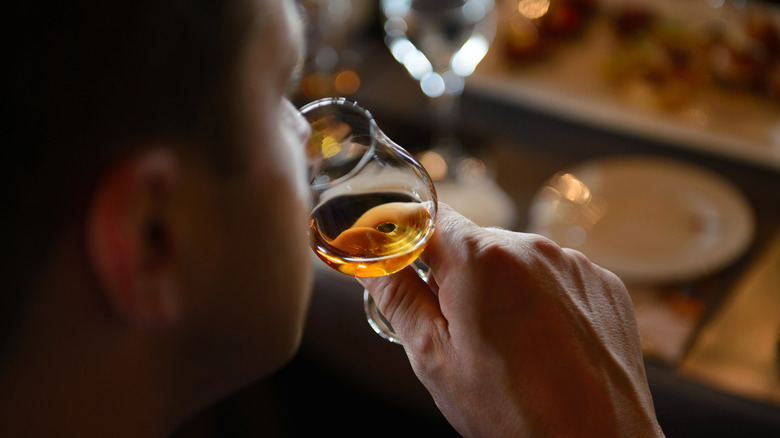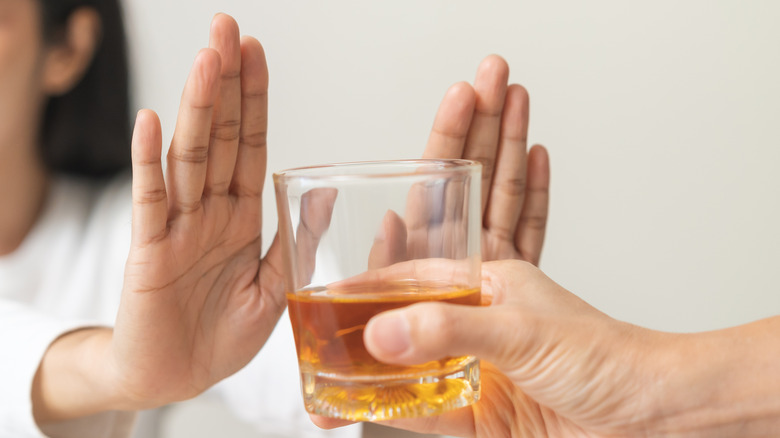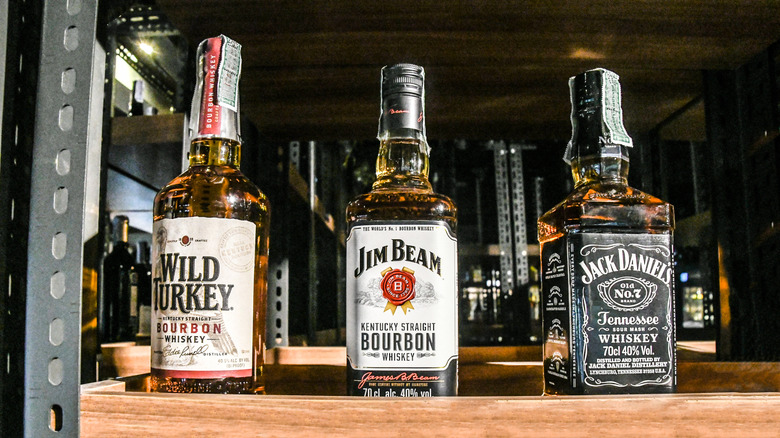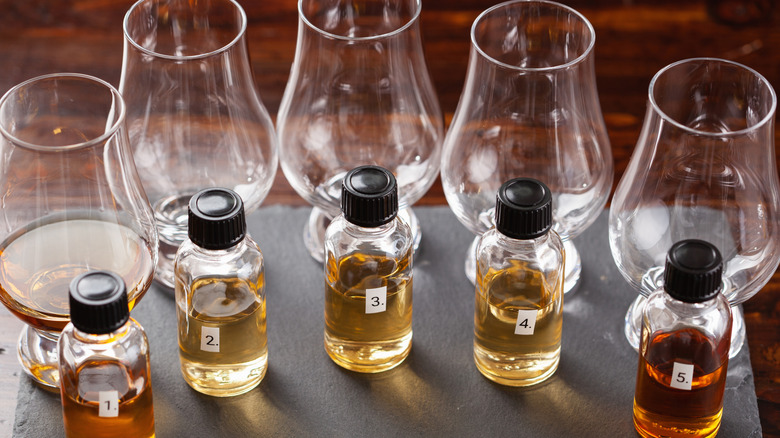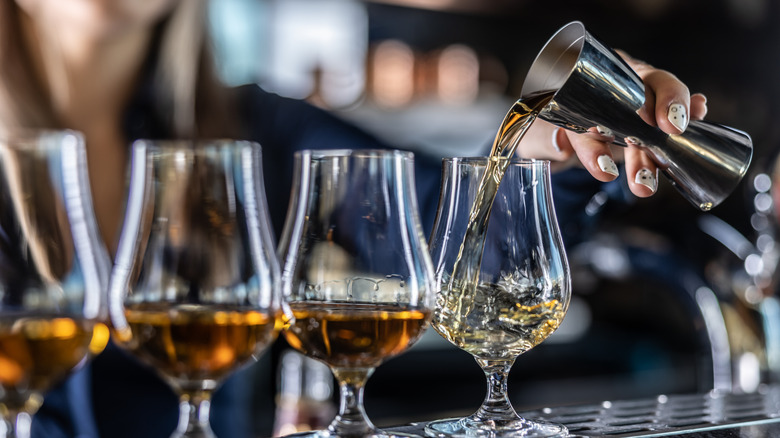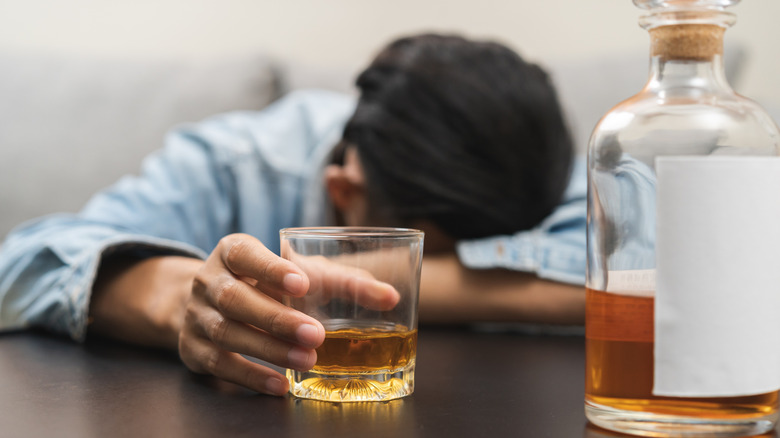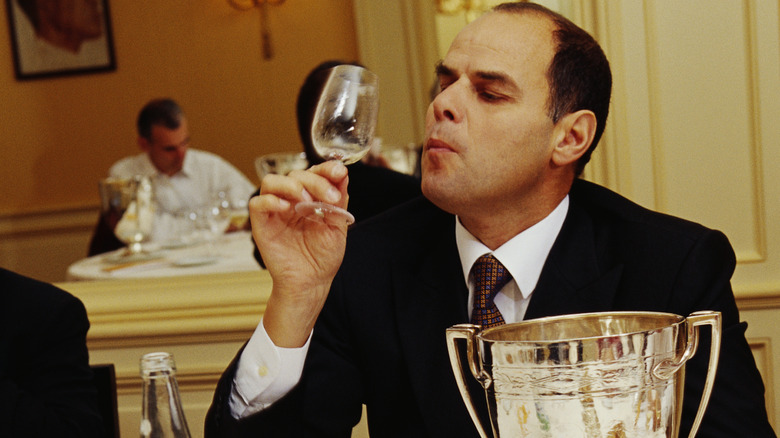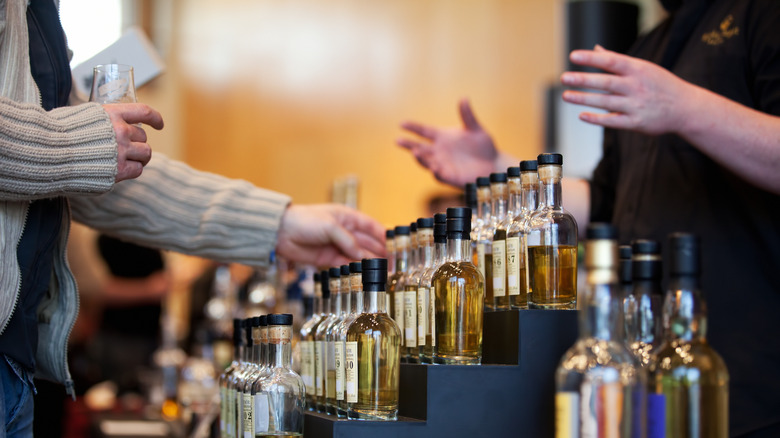11 Rude Behaviors To Avoid At A Whiskey Tasting, According To An Expert
Whether you're a complete newcomer to the world of whiskey or a consummate connoisseur, there's nothing better than a whiskey tasting. These events are an incredible way to expand your palate, meet fellow whiskey lovers, and gain valuable insights from people who work in the industry. They can also be a great way to sample or source rare whiskeys that you might struggle to find online or in your local liquor store.
As a huge whiskey fan who's spent many years working in the bar industry, I've been fortunate enough to attend many tasting events. Whiskey tastings can come in many different forms, including organized whiskey meet-ups, brand-led events, and distillery tours. They can even be as simple as sitting down with some friends and cracking open a bottle that none of you have tried before. Tasting events sometimes have a reputation of being somewhat snooty affairs but I've rarely found that to be the case. They can be extremely fun and laid-back events; however, that doesn't mean there isn't a certain etiquette that should be followed. While some of these may seem obvious, I've seen just as many experienced tasters break the unwritten rules as I have complete novices. Probably more. Below, I'm going to share some behaviors to avoid if you don't want to risk upsetting the host or your companions. Some may be specific to a certain type of whiskey tasting but the majority apply to any kind of tasting event.
Turning up late
Something that's always important to bear in mind is that whiskey tastings — like most events – run on a schedule. The host wants to make sure that all attendees have the opportunity to try all the prepared samples, discuss the whiskeys, and compare tasting notes. If you're visiting a distillery or attending a brand event, the host may be on a tight timeframe, as it's probably not the only tasting event they're running that day. With that in mind, you should always make an effort to arrive on time. And by on time, I mean about 15 minutes early.
Arriving a little early gives you enough time to check in with the host and find your seat. If you're late, the host may postpone the start of the event but this is extremely inconsiderate toward the other attendees. If they push on without you, it can ruin the flow of the event, especially if the host has to spend time getting you situated. Additionally, leaving an event before it's over may also be considered rude. This might be less of a problem if you're attending an extremely casual tasting with a couple of close friends, but it's still not ideal. If you are running late for whatever reason or you know you'll have to leave early, communication is key. Make the host aware as soon as possible and ask if a late arrival or early departure can be accommodated.
Talking over the host
Pretty much every whiskey tasting you attend will have a host. They're usually involved in organizing the whiskey tasting, although this might not always be the case. The host's job is to introduce each whiskey and provide attendees with any information that's relevant to the tasting. They'll often moderate the tasting discussions to make sure everything remains on schedule, and are usually equipped to answer any questions you might have. Talking over the host or failing to pay attention when they're speaking is considered a big no-no.
For starters, you're making it harder for the other attendees to concentrate on what the host is saying. If they have to stop what they're doing, you're also holding up the tasting. You should also remember that while some hosts are experienced professionals who might be getting paid, many are hobbyists who volunteer their time to run a tasting. Just because whiskey is their passion doesn't mean they're an expert at public speaking. Constant interruptions may shake their confidence, which can have a negative impact on the whole event and possibly put them off hosting another in the future. Either way, interrupting the host is rude, you'll end up learning less about whiskey, and you won't be popular with the other attendees. If you have a burning question that's not a matter of life or death, note it down and save it for the discussion portion of the tasting.
Taking over the conversation
A whiskey tasting is about more than just drinking whiskey. Part of the fun is being able to have a group discussion about each whiskey with others. You get to identify and compare tasting notes – potentially discovering aspects you hadn't picked out – and share your opinions on everything you try. However, things typically start to fall apart if one person tries to dominate the conversation.
Everybody should be given the opportunity to share their thoughts at a whiskey tasting. Bear in mind that some people are more comfortable in these situations than others, and taking over the conversation makes it harder for less confident attendees to speak up. In the same vein, always remember to be respectful of other people's opinions. Although there are some common whiskey flavor notes, whiskey tasting is pretty subjective. You might completely disagree with someone's take on a particular whiskey but tastings aren't about being right. There's no need to take up time with meaningless debate, especially if it slows down the event or means others don't get a chance to offer their thoughts. Again, patience is a virtue. If you really want to get into an in-depth discussion, try to wait until the end of the tasting. While I've been to many tasting events that an overenthusiastic attendee threw off track, I've never been to one where there hasn't been time for further discussion once things have wrapped up.
Being unwelcoming to newcomers
It doesn't matter whether you're into whiskey or water polo, every hobbyist starts somewhere. If you're reading this, there's a chance you're getting ready to attend your first tasting and may be anxious about making mistakes. It can seem daunting, especially if you're concerned about coming across as unknowledgeable. Plus, the whole point of a tasting is to learn – I had no idea what "Kentucky Chew" meant until my first tasting. The only time I've ever seen beginners get uncomfortable at a tasting is when someone's made them feel unwelcome due to their lack of experience. If you're someone who does know their stuff, remember what it felt like when you started out.
By all means, offer helpful whiskey-drinking tips to beginners, but be careful not to be patronizing. Never mock anyone's lack of whiskey knowledge, even in jest, as it can knock their confidence and prevent them from asking questions. You should also try to encourage newcomers to contribute to the discussion without putting too much pressure on them – the idea is to build their confidence over time. When I first started getting involved in tastings through work, it was the other attendees who made me feel like I belonged. Without them, I would have missed out on opportunities and knowledge that allowed me to flourish in my bartending career. Be the person who ignites someone's passion for whiskey and encourages them to keep exploring the hobby.
Trash-talking a particular whiskey
Although whiskey preferences are subjective, I'm not going to pretend that there aren't bad whiskeys out there. A tasting event is an opportunity to discuss different whiskeys and express your opinions; however, there's a polite way to do it.
You typically want to avoid subjective language at a whiskey tasting, as it defeats the purpose of the event. Try to express your thoughts from a tasting perspective. For example, a lower-quality whiskey might be "harsh," "flat," or "one-note." Don't say that it tastes like ethanol-infused pond water. At casual events with friends there may be some leeway, but also bear in mind that nobody picked a bad whiskey on purpose. Someone put effort into picking whiskey for the tasting they thought everyone would like; if one turned out to be a dud, they're probably just as disappointed as you are. There's no need to rub it in. Also, it might just come down to personal preference, so ranting about a certain whiskey being terrible might be insulting to someone who loves it. I would say that it's worth being even more tactful if the tasting is part of a brand event or a distillery tour. These are people whose job is to promote a product, and there's no need to make it obvious if you dislike their offerings. I find it's better to hold your tongue on the negatives, compliment the aspects you do like, and simply avoid that particular brand in the future.
Talking about a brand's competitor without tact
When tasting a whiskey, it's pretty common to make comparisons with other brands. However, if the tasting is being run by a particular brand or is part of a distillery tour, you should be mindful of comments that refer to the competition.
It should be pretty obvious that it's rude to make negative comparisons about someone's product to their face. As I mentioned before, you're better off keeping those thoughts to yourself while you're in their company. That said, you also want to be careful about saying anything too negative about their competitors. What many people fail to realize is that the whiskey industry is remarkably close-knit. While that doesn't mean there's no competition, distillers and brand representatives are far more likely to get along with one another than to be involved in some sort of vicious rivalry. You might think that disparaging a competitor's brand will get you on the host's good side, but that's rarely the case. In reality, you're more likely to be insulting their friends, or people they consider colleagues and contemporaries in the whiskey business. At these events, it's better to focus on the product in front of you. If you do bring up a competitor, try to keep things objective. It's fine to discuss things like different whiskey distillation methods, but avoid broaching topics that might make it sound like you're playing favorites.
Disregarding the order of the whiskey tasting
In the same way that there's a method behind building the ideal beer tasting flight, there's a good reason for the drinking order at a whiskey tasting. Some tasting events provide the samples one at a time so there's no way to get the whiskeys mixed up, but that's not always the case. If you're at an event that provides all the whiskeys from the start, make sure to stick with the correct order.
At a tasting, whiskeys are usually ordered from least to most intense. This is to prevent the palate from being overwhelmed by a particularly intense whiskey, thus making it hard to analyze the next one. It's recommended for a whiskey tasting to include palate cleansers; however, they're less effective if you mess with the lineup. For example, you should never start with a peated whisky because the smoke profile is hard to overcome. You'll also tend to find whiskeys with a higher alcohol content – like full proof, barrel proof, or cask strength expressions – at the end of the line for the same reason. Additionally, many tastings save the most premium whiskey for last, so skipping to the end sort of goes against the spirit of the event. Apart from ruining the tasting for yourself, jumbling the order up can also impact the other attendees. If you start discussing a whiskey that's different from what everyone else is sampling, it's likely going to create some confusion.
Ignoring pour limits
A standard pour of whiskey is usually between 1 ½ and 2 ounces; however, the pour size for a whiskey tasting might vary. There are a few different factors that can affect the pour limit but the important thing is that you stick with what you've been given, at least while the tasting session is in progress.
If there are lots of whiskeys to get through, the pour size might be decreased to reduce the risk of intoxication. The same goes for higher-strength whiskeys. However, pour limits are usually calculated in a way that ensures there's enough of each whiskey for everyone to try them all. This is especially important for rarer and more expensive whiskeys, as it may not have been possible for the host to get hold of another bottle. If you take more than your share, there's a chance someone else will miss out. The most polite course of action is to note which whiskeys you're most interested in tasting again and wait until the end of the tasting session. I've been to some tastings that leave the bottles out for everyone to try again, and others where the bottles get packed away as soon as the event is over. Use your judgment as to whether it's okay to ask the host if you can try another sample – if you ask and they decline, accept the decision graciously and move on.
Over-indulging in the whiskey
Whiskey tastings can get messy without some measure of self-restraint. Trust me, I'm talking from experience. While it's not expected for everyone to remain stone-cold sober, you never want to be the one who becomes too intoxicated.
Everyone has a different tolerance to alcohol, so before you start knocking back samples, make sure you know your own limits. I suggest eating a hearty meal before the tasting, as this will slow the rate of alcohol entering your bloodstream. It's a good idea to take advantage of any available snacks and water throughout the tasting as well, particularly as the latter is an effective palate cleanser. If you're concerned that the quantity of whiskey you're being given might exceed your alcohol tolerance, remember that nobody's forcing you to drink every drop. It's not considered rude to leave some in the glass. In fact, I'm sure you'll make plenty of friends if you have whiskey to spare. You should also know that you don't have to actually swallow to taste whiskey like an expert. Like wine tasting, you have the option of spitting out the whiskey once you've tried it. Some tastings will automatically provide a spittoon – essentially a fancy spit bucket – for you to expel the whiskey. If this doesn't appear to be the case, feel free to ask the host at an appropriate moment if they can provide one.
Making a scene at the spittoon
While we're on the subject of spittoons, it's worth talking about the etiquette of how to use one. When most of us think of a spittoon, we picture one of those buckets in a saloon from a Western movie. You know the one — the cowboy swaggers in through the double doors and hocks a gob of chewing tobacco into the spittoon, making it ping comedically. Yeah, that's not how we do it at a whiskey tasting.
While it's not considered gross to use a spittoon at a whiskey tasting, there's no need to make a show of it. Once you've chewed your whiskey, bring the spittoon close to your mouth. Then, quickly and discreetly, spit the liquid into the bucket. I recommend holding the spittoon at a slight angle and aiming for the side to prevent splashback. The other thing to be wary of is where you put the spittoon when you're not using it. I don't recommend putting it on the floor, as there's a chance someone might catch it with their foot and knock it over. I don't feel like "spilling a bucket of spit on the floor" needs its own section in this article – it's clearly something you want to avoid. I suggest putting it on the table. However, make sure your spittoon isn't in anyone's way and try to situate it away from the other attendees, so nobody has to look at the contents when it's not in use.
Handling whiskey bottles or equipment without permission from the host
It's completely understandable that you might want to get a closer look at a particular whiskey bottle. There's nothing wrong with this – in fact, it's often encouraged – but you shouldn't handle a bottle without asking the host's permission first. Other people will likely want to examine the whiskey bottles as well, so be sure to wait your turn.
The same applies to any other equipment the host has provided for the event. Whiskey tastings are usually set up in advance, so refrain from grabbing stuff like extra glasses or snacks without asking — they may already be allocated to someone else. That said, things might be more relaxed if it's just you and a few friends enjoying a tasting at home. These rules are even more important if you're tasting whiskey as part of a distillery tour. Remember that these are active worksites, so you'll often find yourself surrounded by all sorts of whiskey-making equipment and machinery. It's crucial that you never touch or handle any of it without express permission from the host or a member of the distillery staff. Some of that equipment can be extremely dangerous, particularly without specialized training, and it's highly unlikely a distillery wants any guests touching it. Even if the equipment doesn't pose a safety hazard, there's always the risk of contamination. A distillery isn't going to be too happy with anyone who ruins a batch of their precious whiskey.
